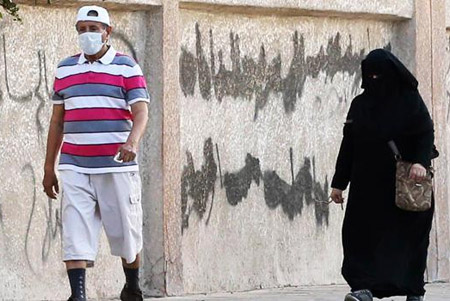 Jeddah, May 4: Health authorities on Saturday reported 18 new infections from the Middle East Respiratory Syndrome (MERS) coronavirus and raised the death toll to 111 in the kingdom, up from 107 on Friday.
Jeddah, May 4: Health authorities on Saturday reported 18 new infections from the Middle East Respiratory Syndrome (MERS) coronavirus and raised the death toll to 111 in the kingdom, up from 107 on Friday.
In its latest MERS update on its website, however, the Ministry of Health mentioned only two new fatalities: a 69-year-old woman in Makkah, who was suffering from tuberculosis and anemia, and a 25-year-old man in Jeddah, who was admitted to a government hospital on April 27, 2014 after displaying respiratory symptoms.
The 18 confirmed cases reported on Saturday, the biggest daily increase in new infections so far, jacked up the total number of cases in the kingdom to 396 since September 2012 when the virus was discovered.
Of the new cases, seven were in Jeddah, five in Riyadh, four in Makkah and two in Madinah. Thirteen are currently in public hospitals and five were sent to home isolation, said the report.
Acting Health Minister Adel Fakeih had earlier said the MOH was currently focusing on a two-pronged approach to prevent and treat MERS and to offer the best health care services to the people in the Kingdom.
In a meeting on Wednesday with members of the National Scientific Committee for the Prevention of Infectious Diseases and officials from the ministries of interior, higher education, municipal affairs, National Guard, defense and private health sector executives, Fakeih urged officials to make more field visits to ensure proper health care during this period of crisis.
Fakeih said the officials should pay attention to the values of sincerity, honesty, and perseverance; perfection and transparency, and provide services with a sense of dedication, kindness and love.
He also urged officials to work as a team and ensure proper coordination with the concerned officials to give the best health care to the patients.
In July many foreign pilgrims are expected to visit Makkah and Madinah during Islam's fasting month of Ramadan. Millions more are expected in early October for the annual Haj.
On Friday the United States said it had discovered its first confirmed case of the disease in a man who had recently been in Saudi Arabia. Egypt said it discovered its first case, also in a man who had been in Saudi Arabia, on Thursday.
Infections of MERS in Saudi Arabia, where it was discovered two years ago, have more than doubled since the start of April, but the total number of deaths has increased at a slower rate.
A higher number of people without symptoms are also being found with the disease, suggesting that the rapid increase in recent weeks is partly due to wider testing of people who have been in close contact with MERS patients.
MERS, a form of coronavirus like the more deadly SARS, can cause fever, coughing, shortness of breath and pneumonia. However, it is not easy to transmit between people and the World Health Organisation has not advised any travel restrictions for Saudi Arabia.
Scientists say the most likely animal reservoir, from which new cases are becoming infected, is Saudi Arabia's population of camels.





Comments
Add new comment